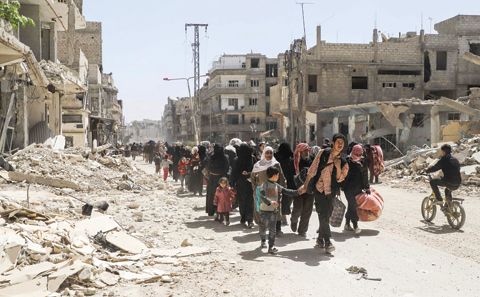
ARBIN, Syria: Civilians evacuate from this town in the Eastern Ghouta region following a deal with the regime yesterday. - AFP
HARASTA, Syria: Several thousand Syrian rebels and civilians began leaving a ravaged pocket of Eastern Ghouta yesterday, in fresh evacuations that further emptied the former rebel bastion. Five weeks since the Syrian regime launched an all-out assault on Ghouta, it holds more than 90 percent of the onetime opposition stronghold on the edge of Damascus. To help it capture the rest, key backer Russia has held talks with various rebel groups to negotiate withdrawals from the three remaining pockets.
One area was emptied in recent days under such a deal and evacuations began late Saturday for a second part, held by the Islamist Faylaq al-Rahman rebel faction. That agreement is set to see some 7,000 rebels and civilians bussed from the towns of Arbin and Zamalka and the district of Jobar to the rebel-dominated province of Idlib in northwestern Syria. Around 980 of them quit Ghouta late Saturday, travelling overnight on buses and ambulances to northwest Syria.
Evacuations resumed yesterday, with more than 3,700 fighters, relatives, and other civilians boarding dozens of buses to leave Ghouta, state news agency SANA said. The vehicles snaked their way through Ghouta neighborhoods that had been reduced to ruins, as residents who chose to stay waved silently from the rubble to their departing neighbors. An AFP correspondent saw some buses exiting rebel territory and driving onto the nearby highway on Sunday afternoon, but they were delayed there for several hours as they waited for the full convoy to gather. By nightfall, buses were still paused at the highway.
Some civilians stepped out to smoke cigarettes and were given biscuits to eat. "I fled the bombs. I decided to leave to save the lives of my wife and children," said Abu Mohammad, a 27-year-old fighter. Residents of Arbin, Zamalka, and Jobar had been bidding tearful farewells to their hometowns all morning, dragging shabby suitcases past bombed-out buildings. Hamza Abbas, an opposition activist in Zamalka, told AFP he was planning to board the buses too. "People are very sad about leaving their homes, their land, their childhood memories and the place where they spent the best days of their childhood," he said. "They have no money, no houses, no furniture or even clothes to take with them because of this bombardment."
As part of Faylaq al-Rahman's deal with Moscow, residents had been offered the option to stay in Ghouta as it fell to the regime, but Abbas declined. "I decided to leave Ghouta because how am I supposed to live alongside someone who killed my family, my siblings, my friends? With someone who destroyed me, my life, and my future?"
Since it began on Feb 18, the Ghouta assault has left more than 1,600 civilians dead, according to the Syrian Observatory for Human Rights. Even before the onslaught, the enclave's 400,000 residents had suffered for half a decade under a crippling regime siege that severely limited access to food, medicine and other basic goods. The Syrian government has used siege tactics followed by heavy bombardment and negotiated settlements to recapture swathes territory lost to rebels.
Damascus and Moscow have applied this "leave or die" strategy to Ghouta as well, smashing the enclave into three isolated pockets before seeking separate evacuation deals for each. The first Russian-brokered agreement saw hardline Islamist group Ahrar al-Sham agree to quit the town of Harasta. More than 4,500 people, including over 1,400 fighters, left Harasta for Idlib on Thursday and Friday. Talks are also underway for a deal over the third and final pocket of Ghouta, held by Jaish al-Islam, which includes the region's largest town, Douma.
The second agreement, reached with Faylaq al-Rahman on Friday, provides for evacuations as well as medical treatment for wounded civilians and fighters and the release of rebel-held detainees. People began leaving Faylaq-controlled territory in Ghouta late on Saturday night. Armed, masked Russian military personnel boarded each bus as it left Ghouta on Saturday night, according to an AFP correspondent. They drove all night to Qalaat al-Madiq, a crossing point into rebel-held territory that is frequently used in such agreements.
Another AFP correspondent in the town, in the central Syrian province of Hama, saw 17 buses and ambulances arrive yesterday morning carrying the first wave of evacuees. From there, they are expected to head towards Idlib, the last Syrian province that remains mostly under rebel control. Tens of thousands of people bussed out of opposition territory have been brought to Idlib in recent years under "reconciliation" deals like those negotiated in Ghouta. The population there has swelled with rebels, jihadists and civilians. Syria's conflict erupted in March 2011 with anti-government protests, but has since evolved into a complex and devastating civil war. - AFP









